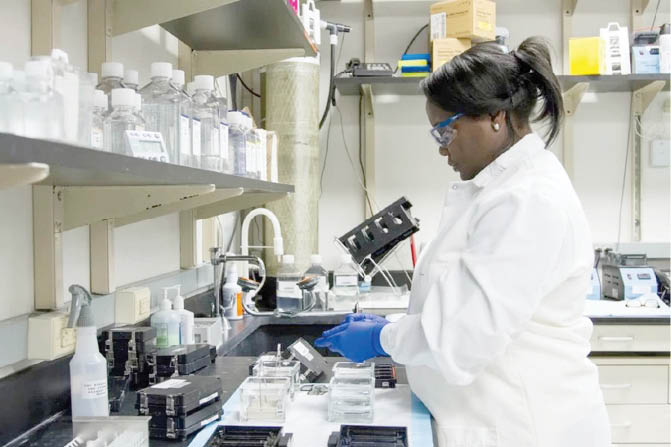Ease the process of procuring leprosy drugs
Leprosy, a neglected tropical disease (NTD), is a chronic and infectious disease caused by a type of bacteria, Mycobacterium leprae. The disease predominantly affects the skin and peripheral nerves. Left untreated, the disease may cause progressive and permanent disabilities. Every year, more than 200,000 people are infected with leprosy globally; Nigeria records 1,000 new cases […]

Clofazimine, a therapy used to treat leprosy, exhibits antiviral effects against the SARS-CoV-2 virus and prevents the inflammatory response seen in more severe forms of COVID-19 PHOTO: Internet
Leprosy, a neglected tropical disease (NTD), is a chronic and infectious disease caused by a type of bacteria, Mycobacterium leprae. The disease predominantly affects the skin and peripheral nerves. Left untreated, the disease may cause progressive and permanent disabilities.
Every year, more than 200,000 people are infected with leprosy globally; Nigeria records 1,000 new cases annually. But there is no available data on the total number of people living with leprosy in Nigeria because, “There is no actual curation,” according to the Leprosy Mission Nigeria.
Those suffering from this disease can’t make any income on their own or engage in any trade, because of the stigma associated with the disease. Often, they are settled in a colony separated from the rest of society, while many are forced to resort to begging.
Those settled are put into leprosarium or lepers’ colony where they are quarantined and treated. There are 64 leprosy settlements across Nigeria but most are in varying states of disrepair as government support dries up, leaving them to their own devices. They are treated with a drug called Multi-Drug Therapy (MDT)—the life-saving treatment for leprosy.
- UTME: Parents, candidates express frustration at registration centres
- Ribadu tackles Canada for ‘denying’ CDS, others visas
Unfortunately, according to the Integration Dignity and Economic Advancement (IDEA-Nigeria), the National Association of Persons Affected by Leprosy, the supply of this essential drug has been delayed for over 11 months now, “Leaving over 3,000 diagnosed individuals, including 800 children, without the medication they urgently need. This delay, resulting from bureaucratic bottlenecks and regulatory requirements, poses dire consequences for those living with leprosy and for public health in Nigeria.”
This delay stemmed out from bureaucratic bottlenecks from the National Agency for Food and Drug Administration and Control (NAFDAC) with the imposition of additional requirements, particularly the Certificate of Pharmaceutical Product (CoPP) for Rifampicin, despite its global acceptance as a donated drug.
The implication of this, according to IDEA-NIGERIA, is that a critical NAFDAC permit has expired on December 31, 2024, and the CRIA (Clean Report of Inspection and Analysis) results will lapse by February 2025, potentially restarting the lengthy supply process. Without immediate intervention, delays will extend until late 2025, leaving patients untreated, and increasing the risk of lifelong disabilities, and reversing progress in leprosy elimination.
We note that denying timely treatment is akin to perpetuating the marginalisation and discrimination of the victims.
We must realise that leprosy is not just a medical condition—it is a social issue. Untreated cases act as reservoirs for the disease, putting communities at risk, increasing transmission and burdening our already strained healthcare system.
Dr Sunday Udo recently captured the situation in an article written where he said: “Fact that these medications are donated free of charge by the World Health Organisation (WHO) makes the situation even more egregious. The procedural delays preventing their procurement not only deepen the suffering of affected individuals but also expose Nigeria to international embarrassment as the only country unable to secure MDT medications for reasons entirely within its control.”
Daily Trust calls on the government through NAFDAC to immediately commence the process of removing unnecessary barriers to the supply of donated medicines. We also call on the Federal Ministry of Health and the Presidency to intervene and see that all encumbrances are cleared.
Nigeria can reaffirm its commitment to leprosy elimination and the health of its citizens by encouraging local production of these drugs and invest heavily in production so as to reduce the overdependence on donor agencies and mitigating the risk involved in the procurement and supply chain disruptions.
If it is a government policy as espoused by NAFDAC, there are many policy reversals and waivers being given by government as far as it will help Nigeria and Nigerians which the procurement of these drugs is not an exception.
We are aware that the government has made commendable strides in fighting the disease which has drastically reduced the infection and transmission of the disease from what it used to be decades ago. This is an achievement which we must not lose.
Leprosy is curable and we must do everything within our power to make sure that these essential drugs are procured and delivered on time so as to help those who are living with it to manage their situation.
